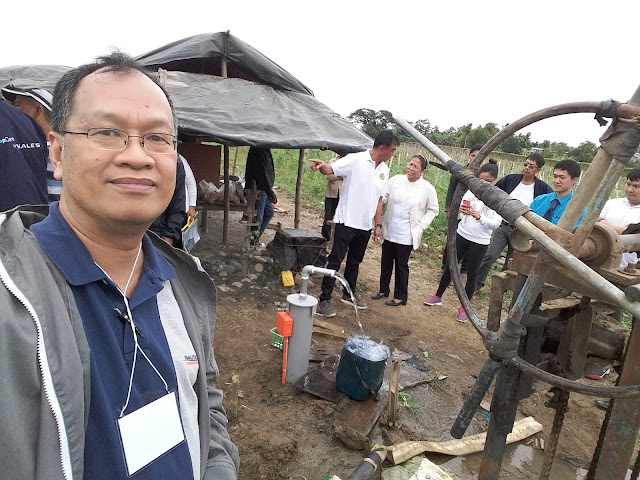 The Department of Agrarian Reform (DAR) has allotted PHP300
million to finance its ongoing project "The PaSSOver: ARBOld Move to Heal
as One Deliverance of our ARBs from the Covid-19 Pandemic,” a project in
response to the Bayanihan to Heal as One Act or Republic Act 11469, where the
President Rodrigo Duterte directed all government agencies to provide, protect
and promote the welfare of the people amid the COVID19 health crisis. Throughout
the nation, there are thousands of CARP farmer-beneficiaries adversely affected
by the COVID19 pandemic.
The Department of Agrarian Reform (DAR) has allotted PHP300
million to finance its ongoing project "The PaSSOver: ARBOld Move to Heal
as One Deliverance of our ARBs from the Covid-19 Pandemic,” a project in
response to the Bayanihan to Heal as One Act or Republic Act 11469, where the
President Rodrigo Duterte directed all government agencies to provide, protect
and promote the welfare of the people amid the COVID19 health crisis. Throughout
the nation, there are thousands of CARP farmer-beneficiaries adversely affected
by the COVID19 pandemic.
Admittedly, the biggest and most
important sector in the country affected by this crisis is the food service
industry, the Philippines being a nation with a thriving agricultural backbone,
the lockouts throughout Luzon (which later on expanded to some major provinces
in Visayas and Mindanao) caused farmers and agricultural workers suddenly unable
to produce, tend their farms, and market their products. It also resulted to
laborers losing job opportunities resulting to massive loss of income.
As the public were forced by the
crisis to stay in their homes to protect themselves and their families, the
local economy ground to a halt but expenses continue to pile up. Business
establishments remain closed and some may never open up again. All of a sudden,
the agri sector is experiencing the largest loss of income in human history due
to the deadly and highly contagious COVID19 pandemic, putting a sudden stop to
physical interactions and almost none on business transactions.
According to DAR Secretary JohnR. Castriciones, the budget for the project will be taken from the realigned
budget of the Agrarian Reform Beneficiaries Development Sustainability Program
(ARBDSP) and unobligated allotment from the different units of the DAR Support
Services Office (SSO). The project aims to give essential support to ARBs for
them to be able to perform their roles in ensuring food sufficiency in the
country.
The project intends to provide
immediate and essential support services to men and women agrarian reform
beneficiaries (ARBs) to mitigate the impact of the enhanced community
quarantine (ECQ) measures due to the pandemic and to address the demands
affecting the agricultural sector even after the ECQ has been lifted or upon the
start of the “new normal.”
The PaSSOver: ARBOld Move project will
provide enable the ARBs, individually and collectively, to
continue performing their roles as frontliners in ensuring food sufficiency for the nation. DAR is assisting the farmers in the distribution and delivery of
agri products by issuing quarantine passes so they could pass
through checkpoints in critical areas under ECQ.
The Agrarian Reform Beneficiaries Organizations (ARBOs) will
also be provided with farm inputs such as seedlings, fertilizers, pesticides,
and farm tools to enable them to resume planting crops for continuous food
supply. It will cover 7,000 hectares nationwide with 90,839 individual ARBs to
benefit from the project. ARB identification cards (ARB
IDs) are also being issued and distributed under the PaSSOver: ARBOld Move project. The ID cards are
being given to identify ARBs and facilitate their access to the government's
social amelioration programs (SAPs). As of April 24, a total of 77,119 ARB IDs
have been distributed by the DAR.
The project will also extend its
support to 1,200 women ARBs nationwide by providing them with livelihood
activities, especially in food production such as egg and poultry production,
hog fattening, and similar activities based on their preferences and
capabilities to ensure they have food on their tables and products to sell.
According to DAR SSO
Undersecretary Atty. Emily Padilla, “the project will also provide packages
containing supplemental food, hygiene products and vitamins to ARB households.
Each package will contain 4 kilos of rice, 4 canned sardines, 4 packs instant
noodles, 2 pieces bath soap, 10 pieces face masks and a bottle of 50 pieces
vitamin C. A total of 126,565 qualified ARBs will benefit from these packages.
“Helping our ARBs will ensure that their agricultural production, livelihood
and income will continue during this health crisis. It will also ensure
sustained supply of adequate, affordable and safe food necessary for Filipino
consumers even upon the 'new normal' will be implemented,"
Meantime, in Cagayan province,
the DAR Provincial Office personnel are presently going around different
municipalities distributing initially the relief packs for agrarian reform
farmer-beneficiaries, to be followed immediately with the distribution of farm
inputs and livelihood kits, to help farmers get on and move on to the new
normal. (Photos by: Mimi Atal-Mora)
CLICK PHOTOs to view:
CLICK PHOTOs to view:
 |












































